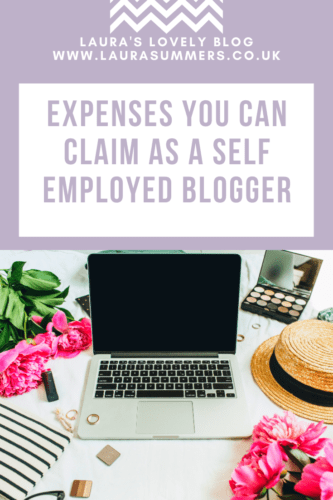*This is a collaborative feature with Printer Inks

Expenses you can Claim for when you’re a Self Employed Blogger
When you start earning money from your blog, you need to become registered as self employed and from therein you are responsible for doing your own tax return.
The biggest advice I could give to anyone starting off as self employed is to set up a spreadsheet for your incomings and outgoings straight away. I have a spreadsheet with the following tabs on it:
- Income – listing details of all money earned and I also use it to keep track of invoice numbers and whether invoices have been paid or are overdue
- Items sent for review – their RRP and if I have sold or donated them on, just so that I can keep track
- Detail of costs or expenses – see breakdown below
- A final spreadsheet tallying them all together so that I can see my net profit
Remember you will need to pay tax and national insurance based on your net, not gross profit. Which is your total income, less your expenses.
If I could give you any other advice, it would be to update your spreadsheet monthly, if not weekly. I find this is one of those jobs that is ok so long as you are on top of it, but as soon as you fall behind it becomes bigger and bigger and then you put it off and when you finally come to completing it, it takes hours and it’s easy to end up forgetting things that should have been included.
Expenses You Can Claim For
Travel, Accommodation and Sustenance
- Milage to and from events, meetings, to places you go to review (currently 45p per mile)
- Train tickets
- Parking costs
- Hotel and accommodation fees if you need to stay over for an event, a meeting or in order to complete a review or professional commitment
Communication and Stationery
- Diary, planner, notebooks and pens
- Printer paper (if you are using the paper for blog related work) and printer inks
- Postage fees – comp prizes, returning items etc
- Business cards
Accountancy and Professional Fees
- Accountancy fees
- Blog hosting
- Domain fees
- Web development, SEO, web design costs
- Professional photographs
- Subscriptions and software – for example PicMonkey, Microsoft office, social media scheduling tools, Photo shop
- Stock photographs
- Phone apps – photo affects, follower monitoring, social media etc
Bank, credit card and financial
- Paypal fees
- Bank charges
- Credit card charges
- Currency exchange fees if you are paid for in dollars as I sometimes am
Rent, rates, power & insurance costs
- Any insurances taken out relating to your work – for example indemnity insurance
- If you work from home you can claim a proportion of your heating, electricity, council tax, internet and telephone use (have a look on the government website for guidance)
- The cost if you rent a space or office to work in
Advertising and business entertainment
- Facebook, Instagram or Twitter advertising fees
- If you have paid for a banner advert or to advertise your blog anywhere else
- Competition prizes
Wages, salaries and other staff costs
- This is if you employ another person for example a VA (virtual assistant)
- Salary costs, bonuses
Other
- Photography backdrops
- Desk equipment, desk, chair etc
- Training as long as it’s to update your current skills, you cannot claim for a new skill
- Camera, camera equipment
- Laptop, laptop equipment
- Tickets to conferences and events
- Blog theme costs
- Photography props
Now some of the above is a little complicated and it depends on how you are running your accounting – I would suggest you ask an accountant for advice here. If you are using traditional accounting here rather than cash based accounting some of these items – computer for example will need to be claimed as a capital expense. As I do this as cash based I can claim these as an expense. You might also want to consider the simple assessment method as it could potentially simplify your tax situation.
I hope this helps with the end of the financial year coming up. I would honestly say if you can do your own book keeping and keep a really good spreadsheet of your costs it really is worth paying for an accountant’s advice in filing your tax return. The cost won’t be too high as you will have done most of the ground work, but mine always saves me money. I would also say, I am not an accountant, so as always with these things it’s good to seek professional guidance.
If you think I have missed any obvious expenses, let me know!

